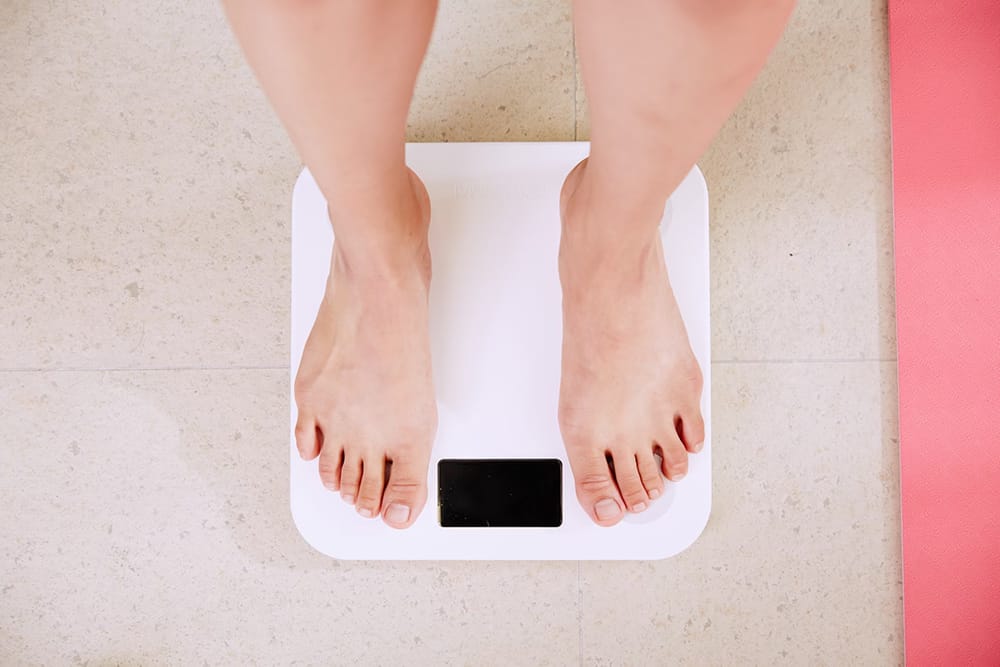No products in the cart.
Health Guides
Weight Management
Top 3 Weight Loss Myths vs Facts

In Malaysia, food is at the heart of every celebration. With so many festive holidays and “open houses” to enjoy, we’re surrounded by delicious dishes all year round! And as much as we love to indulge, there’s always the downside: overeating can lead to weight gain, which brings its own set of health risks. While putting on weight can happen easily, losing it? Not so much. With Chinese New Year around the corner in January, plenty of us are already thinking about ways to shed a few more pounds. So here are some top 3 weight loss myths and facts that we should know.

Standing on the weighing scale to track weight loss progress
Myth #1: Skipping Meals is an Effective Way to Lose Weight
Fact: Skipping Meals Slows Down Your Metabolism and Can Lead to Overeating
Let’s be honest, when it comes to weight loss, the first thought that usually comes to mind is, “I just need to eat less.” We tend to gain weight when we eat more, so it could only be logical to eat less to lose weight. Some might go to the extent of skipping meals in order to lose weight. However, skipping meals can actually slow down our metabolism, which may cause weight loss to be even more challenging in the future.
Our metabolism is very clever, when we suddenly stop feeding it regularly, it would think we’re facing a food shortage and will respond by slowing down. This “famine mode” means the body starts storing more of what we do eat, slowing down our metabolism in preparation for tough times ahead. [1] Sure, we might lose weight initially, but in the long run, skipping meals can make it tougher to keep weight off.
Also when we skip meals by surpressing our hunger, it often leads to an all-out feast later on because we’re just trying to feel satisfied. Sound familiar? We’ll end up eating even more to make up for the hunger, which puts us right back to where we started. So focus on eating a balanced diet tailored according to our body instead of skipping meals.
Myth #2: Carbs Are Bad for Weight Loss
Fact: Carbs Contain Fiber, That’s Key for Digestion
With the keto diet in trend, carbs are starting to be the enemy for weight loss individuals, but carbs aren’t the enemy! Cutting carbs when we’re already eating too much to start with is a correct apporach, however there’s no need to cut off carbs completely. In fact, many carbohydrate-rich foods, like whole grains, fruits, and vegetables, are packed with fiber, which is great for our digestion. Fiber keeps things moving smoothly in our system and helps us feel fuller for longer, which can actually help prevent overeating. [2] So instead of cutting carbs, focus on choosing “good” carbs — the ones that are less processed and packed with nutrients. So yes, you can keep that rice or pasta on your plate; just go for the whole-grain options when you can!
Myth #3: Supplements Can Help Weight Loss Even Without Exercise/Dieting
Fact: Supplements Helps As A Supplement
Many people see weight loss supplements as the “golden ticket” to shedding pounds quickly. And while it’s true that these supplements can help by curbing appetite, boosting metabolism, and supporting blood sugar control, they’re not a magic solution. Supplements can make the journey a little smoother, but they’re meant to support—not replace—a balanced diet and regular exercise. In fact, the real foundation of lasting weight loss lies in healthy eating and staying active. Think of supplements as a helpful boost, not the whole solution. For the best results, pair supplements with a balanced lifestyle.

C-lites as a comprehensive all-in-one formulation for weight loss
If you’re searching for a supplement to amplify your weight loss journey, try C-lites, a premium weight loss supplement, packed with natural scientifically-backed ingredients. It contains Sinetrol® as a natural fat burner, reducing our body fat mass and increasing our resting energy expenditure[3], along with 9 other ingredients to aid in digestion, satiety and energy levels.
While C-Lites offers a powerful support, it’s most effective when paired with a balanced diet and regular physical activity. Together, they form a holistic approach to weight management that’s sustainable, healthy, and rewarding.
Click here to find out more: https://puremed.com.my/product/c-lites/
Reference:
Halsey, L. G., Areta, J. L., & Koehler, K. (2023). Does eating less or exercising more to reduce energy availability produce distinct metabolic responses? Philosophical Transactions of the Royal Society B: Biological Sciences, 378(1885), 20220217. https://doi.org/10.1098/rstb.2022.0217
Slavin, J. L. (2005). Dietary fiber and satiety. ResearchGate. https://www.researchgate.net/publication/229893418_Dietary_fibre_and_satiety#:~:text=High%20dietary%20fiber%20intake%20may,perceived%20merits%20of%20diet%20therapy.
Fytexia. (n.d.). Fat loss for the long term: Sinetrol. Fytexia. https://www.fytexia.com/en/health-areas/metabolism-body-composition/fat-loss-for-the-long-term-sinetrol/
Recommended Articles
Join Our Newsletter
Sign up now to receive the latest news and promotions.
Shop
Learn
Support
KKLIU: 2136/2022 © 2023 PureMed. All rights reserved.

